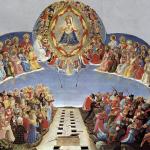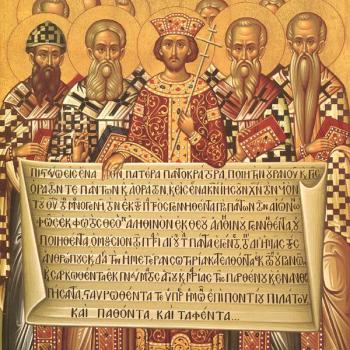 God is infinite, while all created beings are finite. This is a very traditional philosophical convention used to express the distinction between God’s ultimate, unlimited transcendence and the limited quality contained by contingent being.
God is infinite, while all created beings are finite. This is a very traditional philosophical convention used to express the distinction between God’s ultimate, unlimited transcendence and the limited quality contained by contingent being.
The assumption that lies behind this convention is that infinity means unlimited, implying that whatever is limited is finite. For what is finite is what is bound or limited, while the infinite is the negation of such bounds, making it unlimited and without end. This assumption follows the original intention of the words being used, however, as they have become employed in mathematics, the conventions break down. We can find many things which are unlimited in some fashion or another and yet limited in others. What we can show to be infinite can also be bounded. For example, a line is said to be infinite in length, but it is bound by by the plane in which it exists. That plane, itself, is infinite, but it is two-dimensional and would find itself bound by an infinite three-dimensional space. Being bound is being limited, though within that limit, there remains something which is infinite. To understand the convention, and the intention intended by many philosophers and theologians when they use it, we must understand it to mean the difference between something which is absolutely without any limits whatsoever and those things which can be and are shown to be bound in some fashion or another.[1]
What this means is that what is meant by infinity can be relative, and some forms of infinity are greater than other forms of infinity. Indeed, we can take a small space, something which is two inches by two inches in size, and cut it in half, and then cut it in half again, and then again – all the way into infinity. This is, to be sure, the foundation of Zeno’s Paradox in relation to motion. In various forms, the paradox questions how movement from one space to another is possible. To travel from point A to point B, a person would have to arrive at a mid-way point between the two; but then between that mid-way point and point B, once again, the person would have to arrive at yet another midway point, going on to infinity, such that point B would never be attained. The way to overcome the paradox is to understand that there is is a relative, and not absolute infinity, which is being established by such division; it is relative and so can be compared and have its boundaries which can be crossed, while absolute infinite would have no such limit and so no way for it to be crossed over and transcended. Zeno’s Paradox is based upon the problem of relative infinity, equating it with absolute infinity: it is a problem of equivocation, because of what is established in and by one notion of infinity, which is one of being truly unlimited, is being used in the place of another, which is a relative infinity that is indeed bound. There is a sense that it has no end, but there can be, and often is a sense in which it does have an end, the end being the limit itself. With movement, therefore, the space which is being crossed is itself a relative infinity which has such a boundary and therefore, it is crossed over according to the speed of the mover in relation to the size of the space.
Relative infinity, therefore, is for anything which can be apprehended as a kind of infinity, as something which can be shown to have no end in a particular form of measurement, which nonetheless is closed in an itself and so has a limit as to what it contains. When speaking of something as being finite, then, the notion is that it has a limit. It does not mean it is something which cannot be shown to contain some notion of unlimited measure, that is, some form of relative infinity. When speaking of the absolute and its infinitude, this infinitude must not be seen as the same as the relative infinity of something which is limited, but as something which has no limit in any positive conceivable fashion. When some philosophers and theologians say that only God is being infinite, what they mean is that only God is said to be this absolute infinitude. This is how and why immortality, which would end up being infinite because such life would be never-ending, would not contradict the notion of God being the only one who is truly without limit, for contingent beings have a starting point for their life, a point which indicates a limit which is predicated to them but not to God. In this sense, eternal life, life without beginning or end, is God’s alone, though we can participate in it, and so transcend mere temporal immortality, thanks to God’s deifying grace, which is how and why we are said to be called to eternal life. Eternal life is participation in the divine life: it is something which we will share in through unity with God, but it is not something which is ours by nature.
This, then, should remind us to be careful in the way we engage conventions, both the ones we establish for ourselves, as well as the ones others use and establish for themselves. We must look for the intended meaning behind them instead of imposing our own definitions upon them, absolutizing those definitions, and using such an absolutizing of the conventions to equivocate or change the implication of the convention at hand. God is infinite because God is without limits, while there are other forms of infinity which have limits. God is absolutely infinite, while everything else, everything whose being is contingent, relying upon God for its being, can be examined in an infinite variety of ways and yet remain limited in their potency. This is why, if someone were to say immortality is impossible if only God is infinite, they would err, because they would be comparing two different ways of addressing infinity, equivocating God’s absolute unlimited nature with the relative infinity found in conditioned being. When reading about contingent being as being finite, this means it is limited in nature, not that there is not some sort of infinitude which we can discern within it. While it might be useful to state that only God is absolutely infinite and everything else is relatively infinite, because of the confusion that could present to the reader not understanding what relative infinity entails, the convention of infinite versus finite being works, and so should not be rejected, merely commented upon and false implications corrected when necessary.
[IMG=Infinite Spiral Stairs By Ludde Lorentz luddelorentz (https://unsplash.com/photos/YfCVCPMNd38) [CC0], via Wikimedia Commons]
[1] St. Bonaventure, in his Commentary on the Sentences, similarly pointed out that two lines are greater than one, in one sense, numerically, but not in another, that is in length, because they would be equal in regards to length. See Saint Bonaventure, Commentary on the Sentences: Philosophy of God. Trans. R.E. Houser and Timothy B. Noone (Saint Bonaventure, NY: Franciscan Institute Publications, 2013), 253 [Book I, Dist. 43, Art 1.Resp. 1-2].
Stay in touch! Like A Little Bit of Nothing on Facebook













